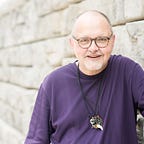How Crow Helped Me Embrace Transformation After My Daughter’s Death
I have discovered the importance of the past through my own challenges with grief, following the death of my eightee-year-old daughter Jeannine in 2003 due to a rare form of cancer. After her death, all of my past values, beliefs and priorities became open for scrutiny. Since the landscape of my life permanently changed after Jeannine’s death, this process of self- examination was necessary so that I could eventually learn to live again in my now different world.
One of the first teachings that I discovered about the importance of the past was during a mountain climb that I did with a friend of mine, several years ago. As we were descending the mountain, I had a revelation that it was easier going down than it was going up; but not for obvious reasons. On the climb up, the territory and terrain were unfamiliar to me. I approached the climb with uncertainty and some trepidation. On the way down, I more clearly saw the path that I took to reach the top and as a result, was able negotiate the terrain more easily.
The Teachings of Crow
For approximately seven years, I have embraced the Native American teachings of nature and animals, as described by Jamie Sams and Ted Andrews. Their wisdom has allowed me to develop clarity, empowerment and greater awareness, following the death of my daughter Jeannine.
In Jamie Sams and David Carson’s brilliant book, Medicine Cards, the teachings of crow are described and paraphrased here: a) they are omens of change, b) they represent sacred versus human law, c) they help us overcome fears and obstacles and, d) they connect us to our past.
There is another significant teaching that is represented in this passage from Medicine Cards:
Honor the past as your teacher, honor the present as your creation, and honor the future as your inspiration .
Crow always reminds us that we can define how we allow our past to influence our present and shape our future. During early grief, my pain was raw, and memories of my past life with Jeannine made it more so. Consequently, there were many days where I wanted to suppress any memories of my past. However, I needed to willingly embrace the past, so that I could navigate my grief in the present.
What I Have Learned…. So Far
Here are some discoveries that I made in the aftermath of my daughter Jeannine’s death, because of the wisdom of crow:
1.In the context of death and other mysteries of the human existence, an understanding of sacred rather than human law, is essential to transformation following life-altering loss.
2.For several years after Jeannine’s death, I was haunted by the memory that I was the last person to see her alive. Today, I believe that I was the first person to witness her rebirth into a new existence. This shift in perspective, allowed me to not only look at the moment of her death differently, but to make peace with it.
3. Because of the work that I did and continue to do following Jeannine’s death, I was able to make peace with another part of my past. My father Austin left me and my mother, Sadie, when I was five years old. I never saw him again. I was angry and felt abandoned because of my father’s absence in my life. Almost three years ago, I discovered that my father’s family had a long history of alcoholism, mental illness and nomadism. My father couldn’t change his history and consequently, was not suited for life in a traditional marriage. I concluded that he walked away because his continued presence would interfere with me and my mother’s happiness. My father’s leaving was an act of unconditional love, not an act of abandonment. Today, I love my father, a love which is as profound as the love that I have for my mother who raised me.
4.Every decision I made in the past contributed to the road that I now travel. I am currently an adjunct professor of psychology at Utica College, do bereavement support in the community, and write and blog on a regular basis. During my past twenty-seven year career in the addictions field, I did counseling, compiled client assessments, conducted regular inservice trainings with staff, and educational groups with individuals requesting addiction services. My past work activities directly relate to the path that I have embraced today.
Looking behind has allowed me to look forward and embrace transformation after the death of my daughter Jeannine.
To wish away our past is to wish ourselves out of existence. — Frederick Nietzsche
